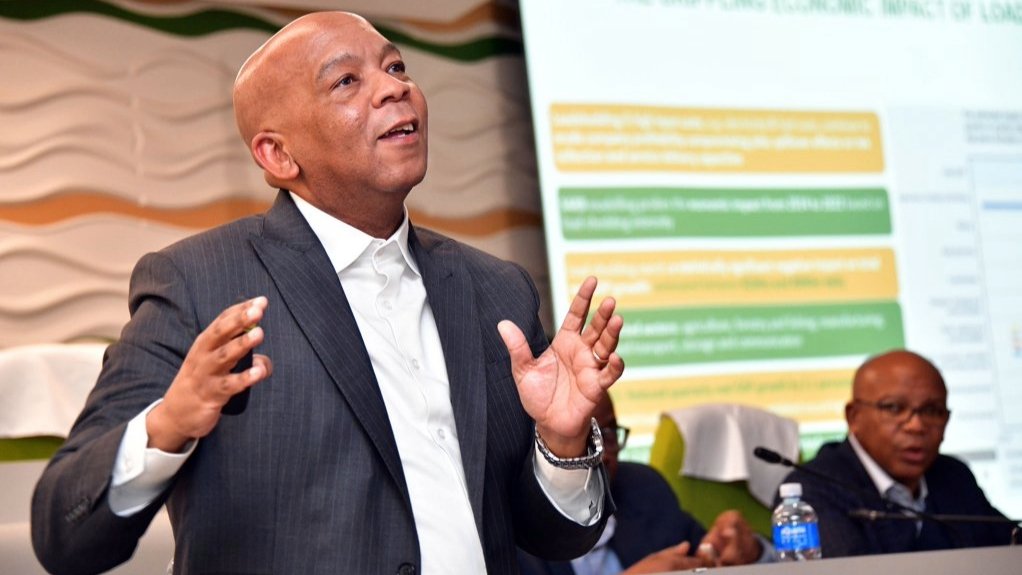Expanded pilot project planned to help munis pay Eskom as arrear debt continues to rise
Electricity and Energy Minister Dr Kgosientsho Ramokgopa reports that a new pilot project is being prepared to further “stress test” an initiative aimed at ensuring that municipalities settle their accounts with Eskom in a context where municipal arrear debt has grown to about R78-billion.
The initiative is reportedly being supported by the South African Local Government Association (Salga), and has already been piloted in three municipalities, namely the Beyers Naudé local municipality, in the Eastern Cape, as well as at the Kamiesberg and Nama-Khoi municipalities, in the Northern Cape.
Speaking during one of his regular briefings, Ramokgopa reported that the idea was to extend the mechanism to about two municipalities in each province, especially those with large unpaid debts to Eskom.
He reported that it drew on an innovation developed in the private sector and could be deployed both to those municipalities that were participating in the debt-relief programme launched by the National Treasury last year and those that did not apply or qualify for the scheme.
He confirmed that the majority of the municipalities that had signed up to the debt write-off scheme were failing to comply with the 14 conditions set by the National Treasury.
“The latest number we have is that 78% of the municipalities that have entered that programme have defaulted, which means it is not effective. So, you need a different instrument; financing is just one leg, we are resolving a bigger problem,” the Minister asserted.
For participants in the National Treasury scheme, it appears that the idea is to help them comply with the conditions for the write-off.
“[But] even if you have not applied for the write-off, it is possible for the municipalities to do two things as a result of this intervention: the first one is to pay your debts and the second one is to ensure that you pay your current account without diminishing the financial viability of the municipality,” he said.
While he did not provide any specifics about the nature of the intervention, he stated that the constraints for many municipalities was not only financial and that other “structural” problems also had to be dealt with to ensure payment to Eskom.
He indicated that a key issue was that municipalities were themselves owed large sums by residents, businesses and government departments, estimating these outstanding debts at about R349-billion.
He said that, while households made up the majority of non-payers, businesses and government departments were contributing a significant portion of the value of revenue not being collected by municipalities.
“If we address [non-payment by business and government] you will see that there is going to be significant relief,” he said, arguing that municipalities should not be expected to “carry” national and provincial departments.
“We are pulling together with Salga on the best way of ensuring that we protect the interest of the municipalities and safeguard the interests of Eskom.”
Ramokgopa again stressed the need to review the country’s electricity pricing policy, which provided the foundations for the way tariffs were set.
He argued that ongoing steep increases in tariffs were not only unaffordable for poor households, but were also placing strain on the middle class and business and that alternative solutions should be found to ensure affordability, including by reviewing the Free Basic Electricity allowance for indigent households, and cost-reflectivity.
South Africa’s electricity pricing policy is based on the user-pay principle and regulated electricity prices are currently set using an allowable-revenue formula that is divided by projected sales to arrive at a yearly tariff adjustment.
Ramokgopa stressed the importance of the National Energy Regulator of South Africa’s independence in determining tariffs, but he indicated that he had requested Eskom to provide his department with prior sight of the application to assess whether ways could be found to moderate the request.
It has been reported that Eskom is consulting on a submission that would lead to a 36% hike being implemented on April 1 if approved.
Article Enquiry
Email Article
Save Article
Feedback
To advertise email advertising@creamermedia.co.za or click here
Research Reports
Latest Multimedia
Latest News
Showroom
We are responsible manufacturers of essential components. Manufacturing 80 million parts a week, we have over 1 billion parts in stock.
VISIT SHOWROOMSika South Africa is a trusted partner for the nation’s infrastructure, commercial, residential, and industrial sectors.
VISIT SHOWROOMPress Office
Announcements
What's On
Subscribe to improve your user experience...
Option 1 (equivalent of R125 a month):
Receive a weekly copy of Creamer Media's Engineering News & Mining Weekly magazine
(print copy for those in South Africa and e-magazine for those outside of South Africa)
Receive daily email newsletters
Access to full search results
Access archive of magazine back copies
Access to Projects in Progress
Access to ONE Research Report of your choice in PDF format
Option 2 (equivalent of R375 a month):
All benefits from Option 1
PLUS
Access to Creamer Media's Research Channel Africa for ALL Research Reports, in PDF format, on various industrial and mining sectors
including Electricity; Water; Energy Transition; Hydrogen; Roads, Rail and Ports; Coal; Gold; Platinum; Battery Metals; etc.
Already a subscriber?
Forgotten your password?
Receive weekly copy of Creamer Media's Engineering News & Mining Weekly magazine (print copy for those in South Africa and e-magazine for those outside of South Africa)
➕
Recieve daily email newsletters
➕
Access to full search results
➕
Access archive of magazine back copies
➕
Access to Projects in Progress
➕
Access to ONE Research Report of your choice in PDF format
RESEARCH CHANNEL AFRICA
R4500 (equivalent of R375 a month)
SUBSCRIBEAll benefits from Option 1
➕
Access to Creamer Media's Research Channel Africa for ALL Research Reports on various industrial and mining sectors, in PDF format, including on:
Electricity
➕
Water
➕
Energy Transition
➕
Hydrogen
➕
Roads, Rail and Ports
➕
Coal
➕
Gold
➕
Platinum
➕
Battery Metals
➕
etc.
Receive all benefits from Option 1 or Option 2 delivered to numerous people at your company
➕
Multiple User names and Passwords for simultaneous log-ins
➕
Intranet integration access to all in your organisation





















